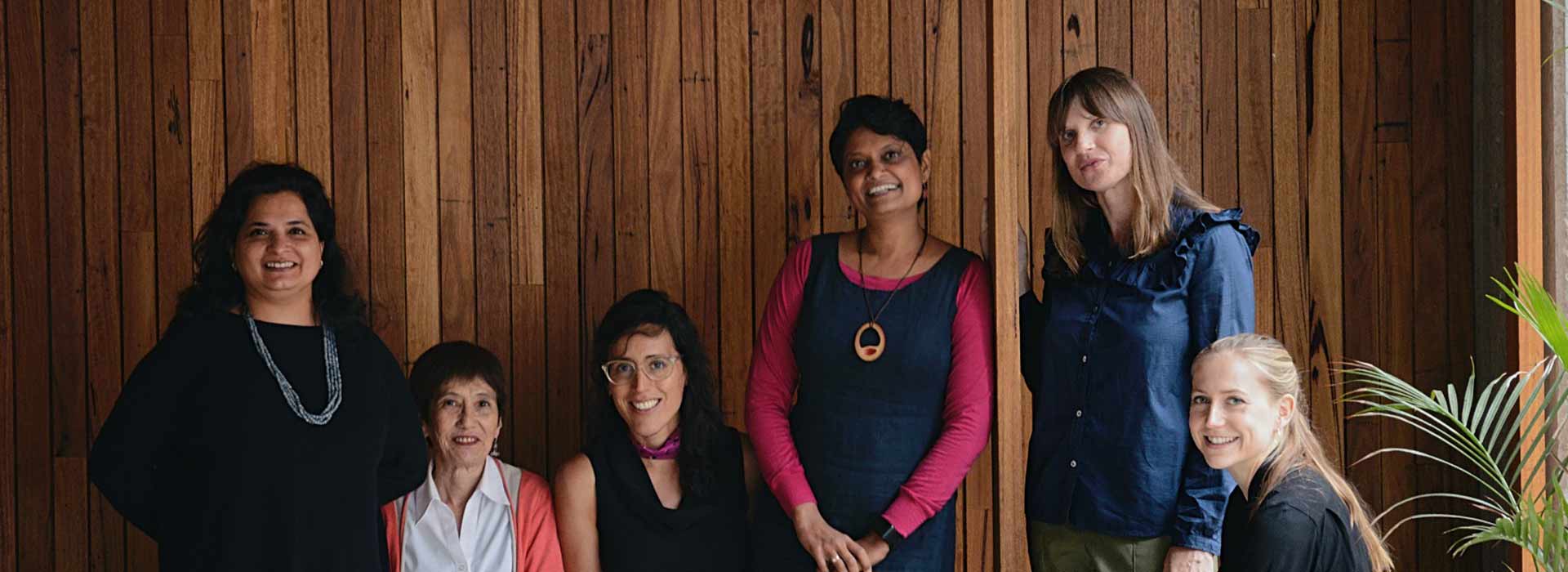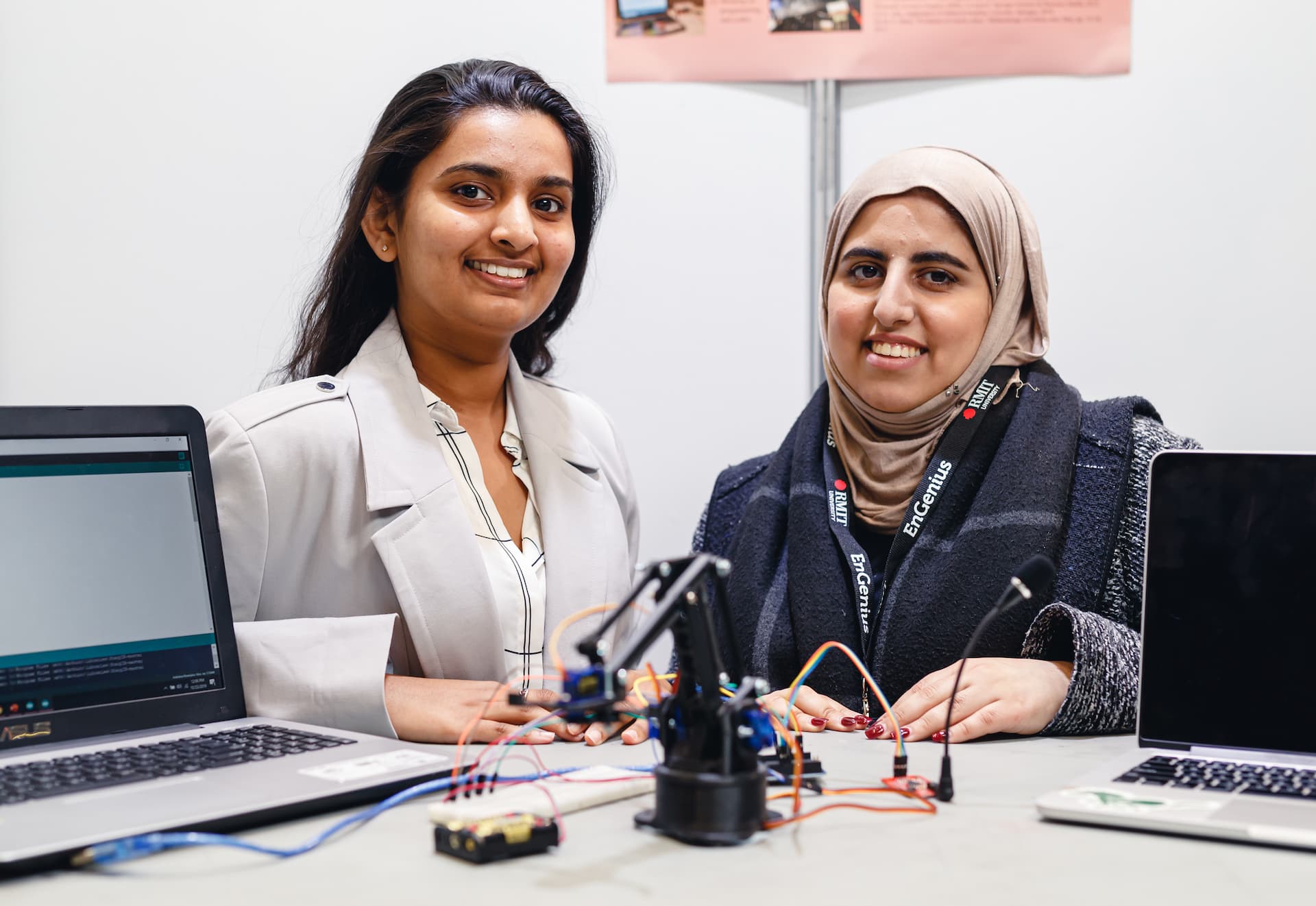RMIT is dedicated to identifying and removing barriers to women's inclusion and progression, with a strong focus on achieving pay equity.
Our Employee Lifecycle Policy, Inclusion Diversity and Equity Policy and various Action Plans outline commitments to ensuring equitable pay and opportunities.
We understand that our success relies on attracting and retaining top talent, empowering all students and staff to thrive, which benefits the entire community.
RMIT values diversity and is committed to eliminating gender stereotypes, roles, and prejudices. We recognise that gender inequality can be compounded by other forms of disadvantage, such as race, ethnicity, disability, and sexual orientation, as noted in Section 6(8) of the Victorian Gender Equality Act 2020.
By addressing gendered expectations that create inequalities, we enhance the learning and workplace experience for everyone.

2022-2025 Gender Equality Action Plan (staff)
Our plan has been developed to provide a framework for identifying and addressing the remaining barriers to inclusion and progression for women in employment at the University.
In adopting and implementing this Gender Equality Action Plan, RMIT demonstrates how it values the richness of diversity among its staff and recognises its responsibility to take University-wide transformative actions to enhance inclusion for all.

Student Gender Equity Action Plan 2023 – 2026
The Student Gender Equity Action Plan 2023-2026 (SGEAP) aims to address key issues facing students who are female-identifying and/or female-expressing. These issues relate to addressing gender-based violence, limited gender roles including leadership roles and gender segregation in fields of study such as women in STEMM. It also aims to address the gender pay discrimination which reveals that women receive lower rewards from investing in their tertiary education than men, especially those completing postgraduate study.
The SGEAP aligns with aspirations of the RMIT's Inclusion, Diversity, Equity and Access (IDEA) Framework as well as RMIT’s long-standing commitment to addressing gender-based violence.
RMIT's Response to Victorian Gender Equality Act 2020/2021
The Victorian Gender Equality Act 2020 is the first of its kind in Australia. The Act sets requirements for the Victorian public sector, local councils and universities, to take positive action towards workplace gender equality.
IImplementing the Act aligns with RMIT’s strategic goals, values and continued commitment to identifying and addressing the remaining barriers to gender diversity and women’s inclusion and progression.
Our 2022-2025 Gender Equality Action Plan outlines a range of objectives and targeted strategies that we will implement across the next four years, in response to the Act.
With this action plan, we demonstrate the continued commitment and importance RMIT places on equity and inclusion.
The main elements of the Gender Equality Act 2020 are:
- Workplace Gender Audit and Survey
- Gender Impact Assessments
- Reporting on the progress of Gender Equality Action Plans
Student gender equity
We want to remove barriers and create equitable experiences for all, ensuring that our students are not limited by gender stereotypes, expectations or prejudices.
- Equity outreach activities raise awareness of education pathways and careers in fields in which women are traditionally underrepresented, particularly in STEMM. STEMM workshops and events for future students.
- Equity access schemes and scholarships support access to education for underrepresented genders.
- Embedding gender equity into our resources and developmental programs for students, staff and industry partners elevates gender equity conversations and builds the capability of our community to challenge limiting stereotypes Gender equity was the theme for 2022’s immersive Big Industry Challenge which included 170 students and 13 industry partner organisations.
- Safer Community provides support and advice to RMIT students and staff concerned about threatening or inappropriate behaviour. Respect RMIT builds a culture of respect to make RMIT a safer place for everyone. We’ve put in place dozens of initiatives to reduce and prevent sexual harm, and to support those affected by it.
- RUSU’s Women’s Department and Queer Department support students, running events, workshops, and advocacy. RMIT Clubs like SWITCH (Society for Women in Information Technology), FIRE+ (Females+ in RMIT Engineering) deliver a range of activities, including industry nights and social events.
Student gender equity outcomes
RMIT strategies and policies to advance gender equity are continuing to achieve the desired outcomes as female students close the gap in access, and outcomes. RMIT tracks commencement, participation, attrition and successful completion by gender (and a range of other priority equity groups) and the most recent indicates that there are not large discrepancies at an institutional level between male and female students. However, the headcount of male and female students at a college level indicates more work is still required to address gender segregation.
RMIT tracks women's likelihood of graduating compared to men's and has in place schemes to close the gap. RMIT reports on these matters to its Academic Board, its key governance body overseeing student matters. In the most recent report:
- Higher education students listing their gender as ‘female’, including those in ‘non-traditional areas’ for women, continue to record outcomes and evaluations mostly consistent with or better than the HE domestic student population overall. Women in these non-traditional disciplines have higher service availability and helpfulness ratings than men, as well as significantly higher scores for Student Progress, Good Teaching, and Overall Satisfaction. Women also have higher scores for ‘graduates in employment’ than men in those non-traditional areas and disciplines.
- Vocational education students who selected ‘female’ as their gender also had a higher ‘module load completion rate’ than those who selected ‘male’. They also recorded higher scores for ‘good teaching’ and ‘overall satisfaction’. However their employment rates were around 3 percentage points lower than men’s.
Workplace Gender Equality Agency Compliance Report
In accordance with the requirements of the Workplace Gender Equality Act 2012, RMIT lodges its annual public report with the Workplace Gender Equality Agency (WGEA) yearly in May.
As an RMIT staff member, you may make comments on the report by contacting the Inclusion, Diversity, Equity and Access Team at diversity.inclusion@rmit.edu.au or by submitting a comment to WGEA. Please refer to the WGEA guidelines on this process on their website.
- Download Employer statement - WGEA Pay Gap Publication 2025 (PDF 65.7 KB)
- Download RMIT WGEA Report 2024-2025 (PDF 960KB)
- Download RMIT Training WGEA Report 2024-2025 (PDF 1MB)
- Download RMIT Online WGEA Report 2024-2025 (PDF 1MB)
- Download Certificate of Compliance with the Workplace Gender Equality Act 2012 (PDF 262 KB)
- Download RMIT EOCGE Certificate (PDF 89.2 KB)
Athena Swan Gender Equality in STEMM
RMIT‘s efforts to improve gender equity have been acknowledged with an Athena Swan Bronze award, part of the Science in Australia Gender Equity (SAGE) initiative. This program promotes women’s career development in STEMM and provides support to encourage staff success.
RMIT has joined the Science in Australia Gender Equity (SAGE) Athena Swan Pilot to improve gender equity and diversity in the Science, Technology, Engineering, Mathematics and Medicine (STEMM) disciplines.
- For membership information including login details please contact People Connect (people.connect@rmit.edu.au)
- SAGE Athena Swan
- Women in STEMM Gallery

Celebrating Women in STEMM
The College of Science Engineering and Health - Celebrating RMIT's women in STEMM.
Flexibility, Carer and Parenting Toolkits
RMIT has a responsibility to ensure their people have the opportunity to take care of their life just as they take care of work.
To support this, RMIT will increase the promotion of flexible work practices that supports all people with parental, caring and other responsibilities to manage their work life balance.
Women Researchers Network (WRN)
RMIT’s Women Researchers Network (WRN)
The Women Researchers’ Network (WRN) was established in 2013 to enable RMIT female academic staff and research fellows at all career stages to connect with each other, share opportunities, access resources and participate fully in positive, active professional development.
What is Safer Community?
At RMIT, we are committed to providing a respectful and safe place to study and work through our policies, provisions and developmental programs for staff and students. Safer Community is RMIT's dedicated service for students and staff to report unwanted or threatening behaviour.
This includes sexual harassment, assault, and family violence, as well as other concerning or inappropriate behaviours.
If you are feeling unsafe or unsure what to do about threatening or unwanted behaviour, you can talk to us about your concerns and options – even if the behaviour happened off campus.
Days of significance
- International Day of Girls and Women In Science - 11 February
- International Women's Day - 8 March
- Equal Pay Day - Aug/Sept
- International Day of the Elimination of Violence Against Women - 25 November

Employer of Choice for Gender Equality
RMIT is proud to be an Employer of Choice for Gender Equality, recognised by the Workplace Gender Equality Agency. As an Employer of Choice for Gender Equality with the Workplace Gender Equality Agency, RMIT has made the latest application for this citation available publicly.
Download 2019-2020 application (PDF 3.4 MB)
Download 2021-2023 application (PDF 7.2 MB)
Download 2023-2025 application (PDF 837 KB)
For feedback or questions regarding this submission, please contact diversity.inclusion@rmit.edu.au


